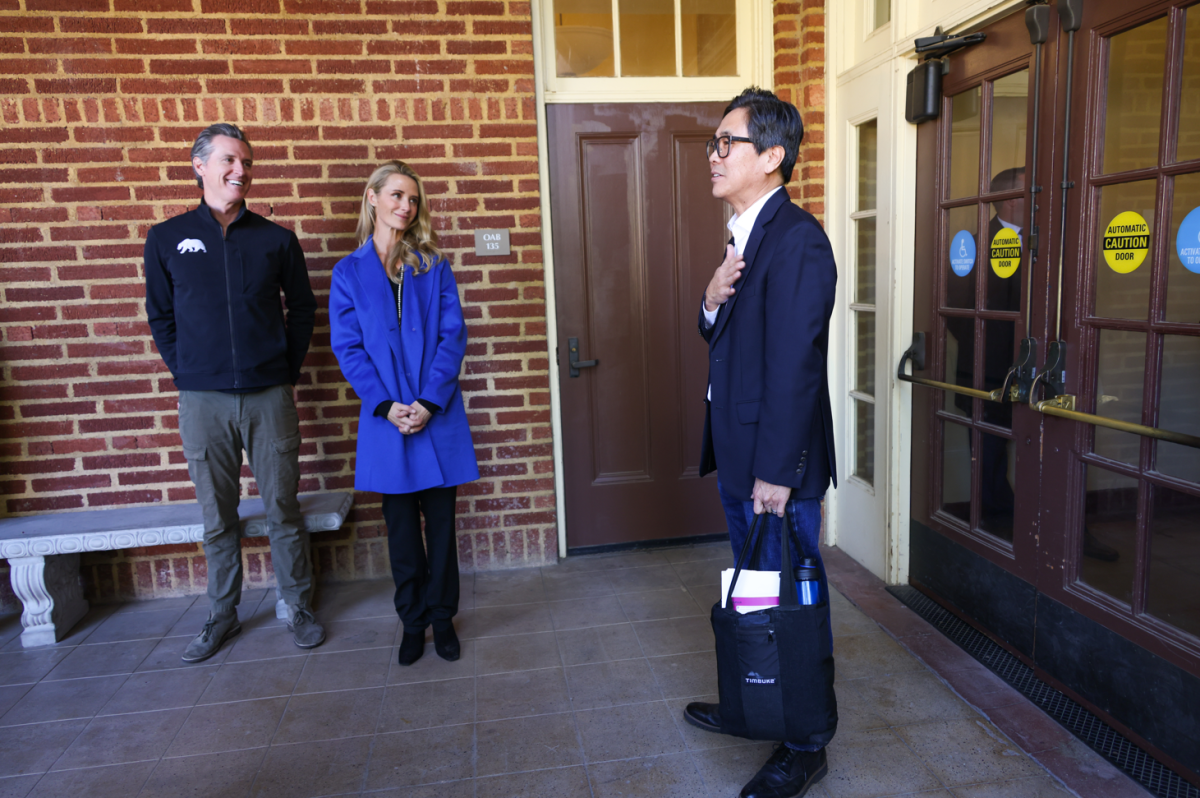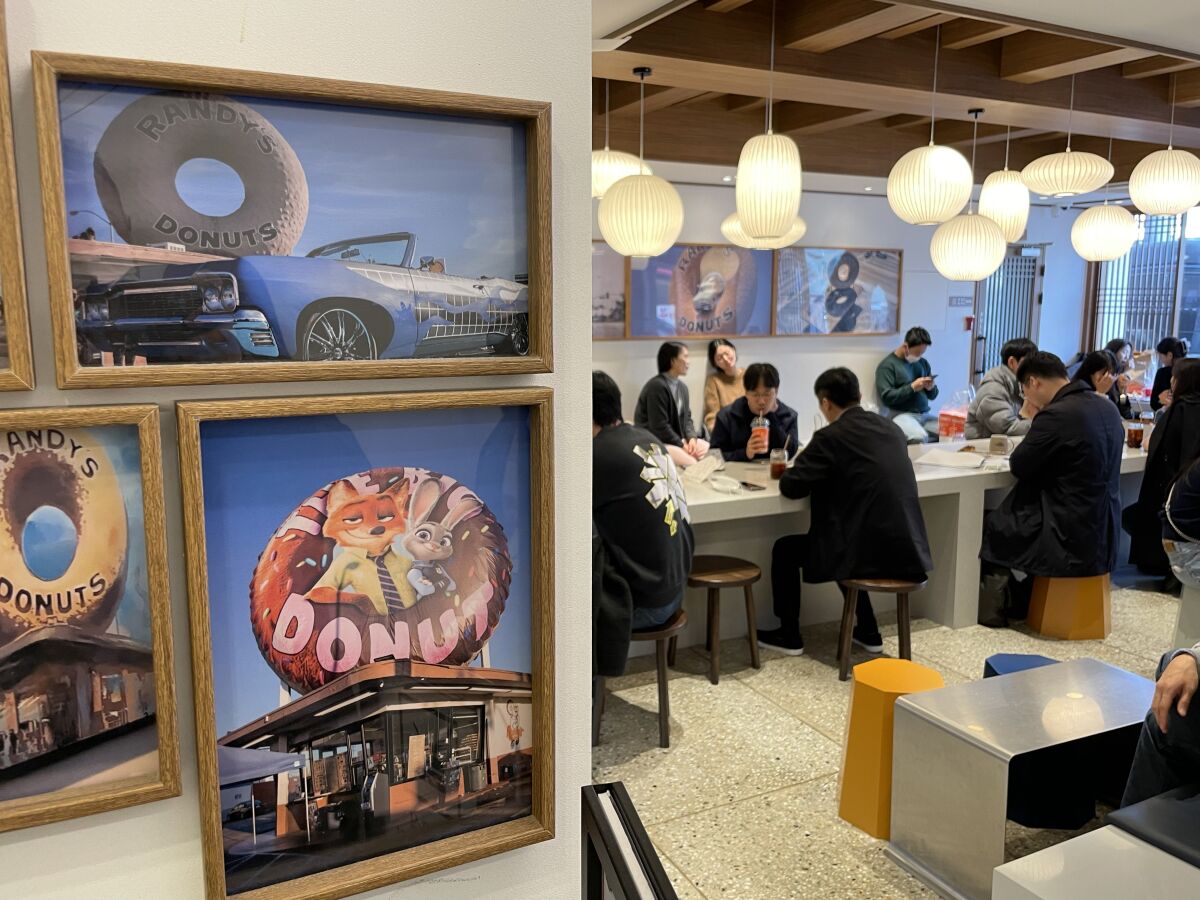Good morning, and welcome to the Essential California newsletter. It's Wednesday, Nov. 30. I'm Ryan Fonseca.
As I read this month that Gov. Gavin Newsom had appointed Fresno resident, writer and professor Lee Herrick to be the state's 10th poet laureate, I wondered: What exactly does a poet laureate get paid to do?
So I reached out to ask him.
"Each poet laureate, typically, is asked to advocate for poetry, educate and bring poetry to as many communities as he or she or they can," he told me. "That can take the shape of readings or talks ... in everything from a grade school to a university to a prison to a book club — and everything in between."
The state Senate needs to sign off on his appointment, but once that happens and he signs the oath of office (possibly by email), Herrick will begin his two-year gig as our state-sanctioned wordsmith. He'll be the first Asian American to hold the position.
Herrick was born in South Korea and adopted by a white family when he was 10 months old. He was raised in California, initially in Danville, and later settled in Fresno with his wife and daughter. The 52-year-old teaches at Fresno City College and in the MFA program at the University of Nevada, Reno, at Lake Tahoe.
I asked him what he wants to accomplish in the new role. He told me about his platform, dubbed "Our California," which he hopes will "bridge poetry with social justice and civic engagement organizations" across the state.
"It's a way for those folks to meet the poetry community and, vice versa, to bring those groups in conversation," Herrick explained. "And hopefully, through those conversations, continue to make improvements in their communities through literacy, poetry, activism and engagement."
Herrick said the diversity in California makes it an ideal place for poetry.
The sound of communities, the accents, the flavors, the history, the music, the dreams of immigrants and refugee and working-class communities —that's where my mind and my poems often want to go.
Here's more of my conversation with Herrick about his upbringing, the appeal of poetry and why he wouldn't want to write it anywhere else. (The conversation has been edited for clarity and brevity.)
What about poetry sets it apart or makes it unique for this kind of role?
Lee Herrick: Poetry can be a succinct but also an expansive way to celebrate an occasion or an event. I remember when the Bay Bridge was rebuilt ... the poet laureate at that time read a poem at that opening.
Often, people will have a poem as part of their wedding. Or sometimes it's read at someone's memorial service after a death. Sometimes people include it at a graduation or any other number of really significant moments in people's lives.
I also think that it's accessible. ... You just need your imagination, something with which to write, and something that you want to say.
It doesn't look like it's going to happen anytime soon, but take California's plan for a bullet train. Is that something you can see yourself marking with a poem?
I would happily do that! Sometimes it's not the easiest thing for poets to write an occasional poem, they call it, and this is also difficult for me [chuckles]. But I would absolutely be honored.
I do hope it's built someday. We've got the beginnings of it here in Fresno. But who knows if it's ever going to be finished.
How does your heritage and upbringing inform your art?
I was the only person of color in my family. At times that was isolating, I realized as I got a little older — and luckily, my family was open and receptive to my growing awareness of race and difference and racism.
Even from a young age, I noticed the nuances of race. I noticed when someone would recoil hearing a Spanish accent — even slightly. I noticed when somebody would be uncomfortable around a Black male or other microaggressions that I received regularly —being told I "speak American well"... or am I a math major.
Poetry is a place to put all of those questions, all of those emotions, all of that anger that I often felt growing up — and also a lot of confusion about my identity and the circumstances of my adoption and all of those things that I think poets and other artists can relate to.

Gov. Gavin Newsom and wife Jennifer Siebel Newsom meet with Lee Herrick, recently appointed to be the state's 10th poet laureate. (Office of Gov. Gavin Newsom)
What about California stands out to you and makes it a good environment for poetry?
One of the first places I go to — and I don't know how unique it is to California — is the amazing, passionate and compassionate teachers that I've had throughout my life. I feel like the educators here transform lives. They changed my life.
Also — and I hope it doesn't sound too negative — but it would be the traumas and the troubles of the state's history and present. The Fresno Fairgrounds here was one of the sites of a Japanese internment camp. I was just reading about 1849 and 1850 when we became a state — the 31st state — how many people of color were denied claims to the gold. That, quite frankly, inspires me to write. It might be trouble and trauma, but those are things of poetry in my mind.
The young people that I teach and the people doing the work — whether it's with language or access or opportunity or anything else with social change. The innovation of the state is deeply inspiring and often fuel for poetry as well.
There's nowhere else I'd want to be a poet. It's joyful to me.
Does this position come with any perks? Can you skip the line at the DMV? Do you get a complimentary express lane transponder?
[Laughs] I would love perks like that! My sister and brother-in-law jokingly made me a crown ... that they wanted me to wear for a photo. That was fun.
It does come with a stipend, which I'm still not sure what that's going to be. But no other perks. But now you've got me thinking of all the things I would gladly accept [laughs]. Free tacos!
And now, here's what's happening across California.
Note: Some of the sites we link to may limit the number of stories you can access without subscribing.
ADVERTISEMENT BY Ocean Conservancy

There's Still Time to Triple Your Impact for the OceanGiving Tuesday is over, but this opportunity is not. Your gift to Ocean Conservancy today will be TRIPLED to support critical work toward a healthy ocean. From organizing local trash cleanups to testifying before Congress about the threats facing our ocean, Ocean Conservancy tackles our ocean's problems from all angles. When you give to Ocean Conservancy, you help give back to the ocean that gives us so much every day. Your gift today triples in value: every $1=$3 for our ocean mission. Don't wait, give today.
End of advertisement
|
|
L.A. STORIES
You may think of the Comedy Store or the Laugh Factory as the places to catch a set in L.A., but that only scratches the surface. Comedy's underground scene is tucked away and thriving in backyards, living rooms, warehouses and other secluded stages. Jake Kroeger talked with the funny and creative people who organize the sets and keep the jokes flowing. Los Angeles Times
Check out "The Times" podcast for essential news and more
These days, waking up to current events can be, well, daunting. If you're seeking a more balanced news diet, "The Times" podcast is for you. Gustavo Arellano, along with a diverse set of reporters from the award-winning L.A. Times newsroom, delivers the most interesting stories from the Los Angeles Times every Monday, Wednesday and Friday. Listen and subscribe wherever you get your podcasts.
POLITICS AND GOVERNMENT
UC academic workers are in their third week of a labor strike — the largest in U.S. history. Tens of thousands of teaching assistants, tutors and fellow scholars employed through the university system are demanding better pay and benefits to keep up with the cost of living. On Tuesday afternoon, postdoctoral scholars and academic researchers reached a tentative agreement with UC officials, though the strike will continue. Los Angeles Times
State regulators say oil companies have some explaining to do. The California Energy Commission kicked off hearings Tuesday in an effort to understand why Californians had been paying so much at the gas pump. They didn't get too far, though, with one analyst saying the state is "completely in the dark" on how the oil companies operate. The Mercury News
CRIME, COURTS AND POLICING
Who recorded and later leaked the now-infamous audio from a meeting among some of the city's prominent Latino leaders? The Los Angeles Police Department is one step closer to finding out. Detectives have served several search warrants as part of the criminal investigation into those leaked recordings (we have a full, annotated transcript here). That includes warrants for social media accounts — namely, the Reddit account where the audio was first published. Los Angeles Times
HEALTH AND THE ENVIRONMENT
Under a state law that took effect at the start of this year, California hospitals are required to post their financial assistance policies on their websites to let uninsured or cash-strapped patients know about possible free or discounted care. Spoiler: Some hospitals haven't been following the rule. Los Angeles Times
More doctors in California are screening for adverse childhood experiences, but new reporting from CalMatters shows a failure to track whether patients receive therapy or other services designed to help them. Adverse childhood experiences — various forms of abuse and neglect, exposure to substance use, violence or parental separation — can lead to chronic physical and mental health issues into adulthood. The state launched an initiative in 2020 to reduce those experiences by half within a generation. CalMatters
CALIFORNIA CULTURE
Donuts just make sense in any language. L.A. Times columnist Frank Shyong discovered that on a recent trip to Seoul, when he found himself in a Randy's. It's actually one of five Randy's donut shops in South Korea. Frank writes: "You start to wonder, why bother dragging yourself to another country? Just wait long enough, and an algorithmically optimized selection of the world's most viral foods and experiences will likely appear in your city." Great, now I'm craving a maple raised and a chocolate buttermilk. Los Angeles Times

A Randy's Donuts in Seoul. (Frank Shyong / Los Angeles Times)
Free online games
Get our free daily crossword puzzle, sudoku, word search and arcade games in our new game center at latimes.com/games.
CALIFORNIA ALMANAC
Los Angeles: partly sunny, 62. San Diego: partly sunny, 61. San Francisco: sunny, 59. San Jose: sunny, 60. Fresno: sunny, 61. Sacramento: sunny, 59.
AND FINALLY
Today's California memory is from Jan Rasmussen:
I moved to SoCal in 1983 when I was a naive 26-year-old woman, tired of cold winters and low pay in my rural Virginia hometown. Six weeks earlier I had met another young woman who was also headed to SoCal. We each packed up our cars and drove to California. My new friend had a connection I did not — she had a distant relative in Sun Valley we could stay with. We soon found an apartment to share in the Miracle Mile. After 39 years, I wouldn't dream of leaving.
If you have a memory or story about the Golden State, share it with us. (Please keep your story to 100 words.)
Please let us know what we can do to make this newsletter more useful to you. Send comments to essentialcalifornia@latimes.com.
No comments:
Post a Comment